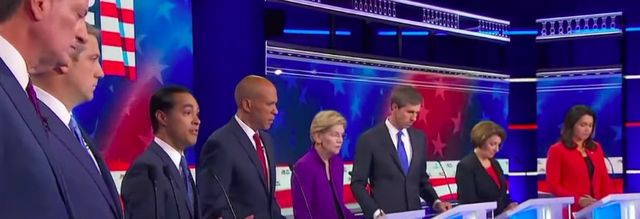More women took the stage at last night’s presidential debate than ever before. At the first of two Democratic debates this week, Elizabeth Warren, Amy Klobuchar, and Tulsi Gabbard, three of the women running for the Democratic ticket, helped make history: the total of six women running will outnumber the five women before them who have taken that stage in America. This momentous shift in gender representation on the political battlefield helps to normalize the legitimacy of a female candidates, who face sexism, particularly on the debate stage. According to The Washington Post, while “male politicians are rewarded for assertiveness…women pay a higher price for ‘going negative.’” Although debates are designed to encourage disagreement between candidates, a gendered double standard commends men who engage in that natural environment of dissent, while punishing women for doing the same. The women who spoke yesterday, and the three that will go on tonight, Kamala Harris, Kirsten Gillibrand, and Marianne Williamson, are not just making history – they’re paving the way for the future of American politics.
The three women who took part in the first half of the two-night Democratic debate shone light on different issues, highlighting the diversity of the playing field. Warren, the frontrunner of the first night and the only candidate onstage polling at double digits, dominated the beginning of the debate. She was particularly strong on the economy and healthcare – taking on giant corporations, and notably saying that she supports abolishing private insurance in favor of “Medicare-for-all.” Many analysts declared Warren the debate’s winner, and strongest speaker of the night.
Klobuchar also proved herself with soundbite-worthy one-liners, her most memorable moment addressing male candidate Jay Inslee, who interrupted Warren to say that he was the only person onstage to pass legislation to protect reproductive rights. Klobuchar, addressing the historic nature of the night, replied sharply: “There’s three women up here that have fought pretty hard for a woman’s right to choose.” The third woman Klobuchar is referencing, Tulsi Gabbard, highlighted foreign policy by establishing herself as the anti-war candidate, but received little speaking time outside of that segment.
This debate was not just extraordinary in the number of women who graced the stage to fight for the presidency, but in the number of minutes they were able to speak. Gabbard, Klobuchar, and Warren actually averaged more speaking time (8.1 minutes) than their male counterparts (7.8 minutes). However, there’s still room for improvement, as two male candidates, Cory Booker and Beto O’Rourke, took up the most time. Elizabeth Warren rounded out third in minutes of speaking time, but she struggled to get air-time in the second half of the debate, with fewer of the questions directed towards her. Laura Bronner of fivethirtyeight made an interesting point, suggesting that because women are judged more harshly for interrupting, they may need to be called on to talk more than their male counterparts. Elizabeth Warren was the only candidate on stage who did not interrupt anyone.
The undeniable female presence on stage, along with the threats recent events have posed to womens’ rights, may have been responsible for the debate’s focus on issues particularly relevant to women. This included abortion, of course, with all the candidates agreeing on protections for reproductive rights, and Julián Castro importantly bringing up reproductive justice, the neccessity to provide care for low-income women and trans people (although he did mess up his wording there). Cory Booker also brought up violence against trans people, particularly trans people of color. The discussion also included support for affordable childcare, a commitment to fight maternal mortality, and a general consensus on the need to close the gender pay gap. Klobuchar did not ignore black women in this conversation, bringing up that while white women make 80 cents to every dollar a man makes, African-American women only make 61 cents.
The first night of the debate made it clear that male frontrunners, like Biden and Sanders, are going to have their work cut out for them, with fierce competition like Warren, Klobuchar, and Gabbard to contend with. Warren, who is second in the polls behind Biden, proved herself to be especially dominant, giving the most comprehensive policy plans and clearest answers out of any of the ten candidates. And one of her clearest messages of the night? That she’s sure as hell ready to take down Trump.
Top photo via ABC News
More from BUST
Kamala Harris’ Interruption By a Male Protester Disrespects Black Women’s Voices
Joe Biden Opposes Hyde Amendment—After Supporting It For Forty Years
Alexandria Ocasio-Cortez Opens Up About Regularly Receiving Death Threats


